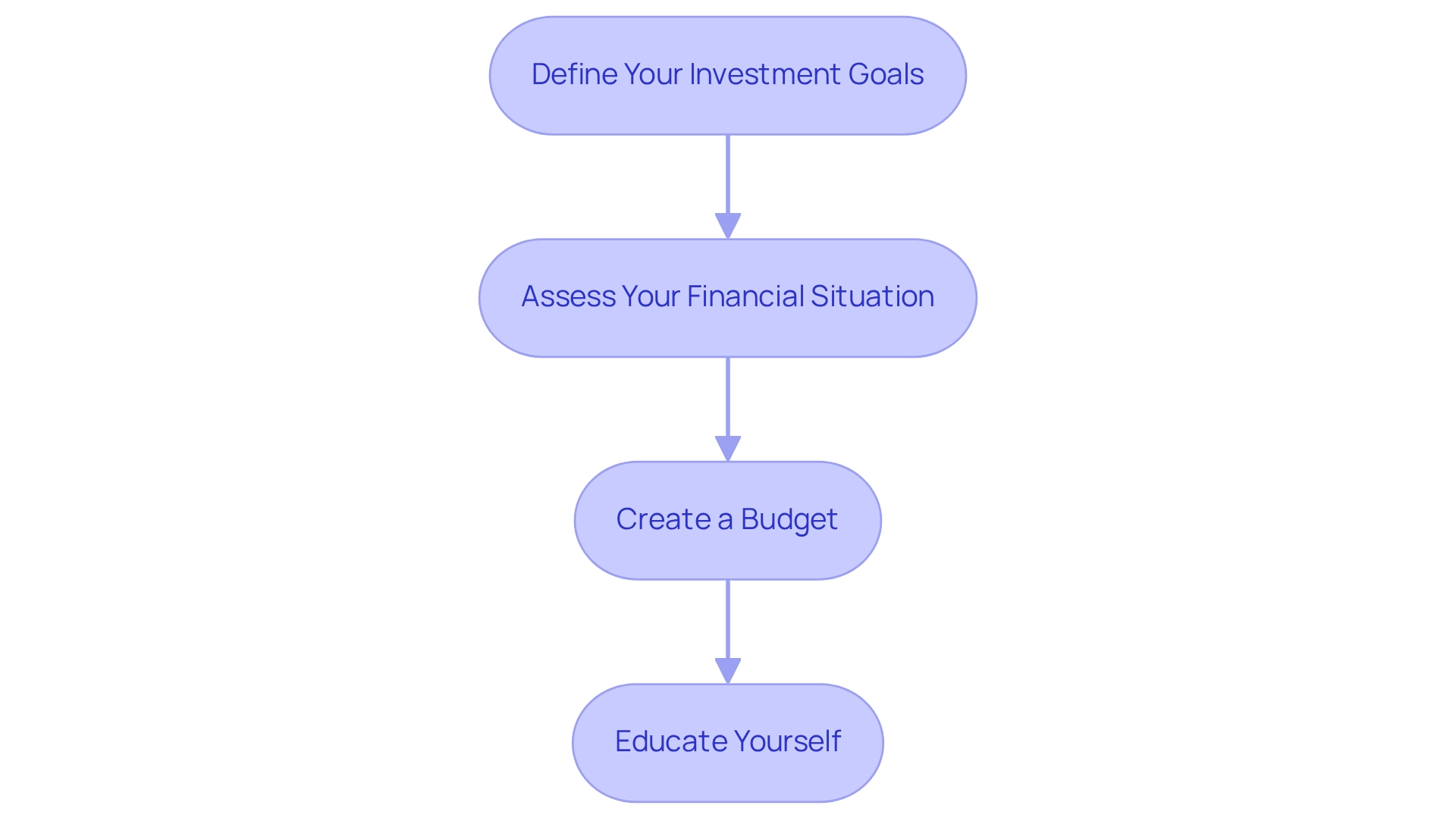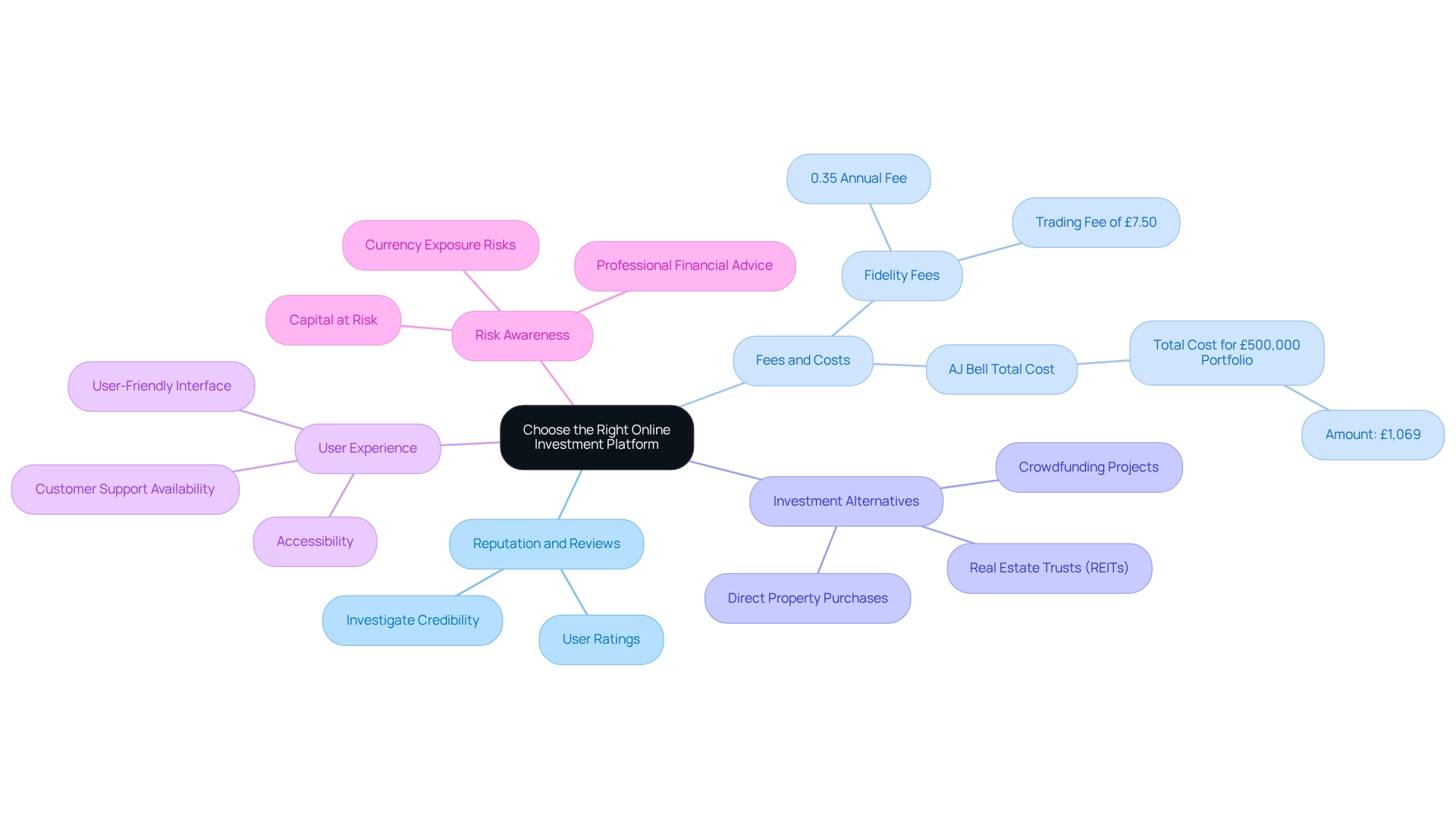Overview
The article delineates five essential steps for successful online real estate investment:
- Defining investment goals
- Assessing financial situations
- Choosing the right platform
- Conducting thorough research
- Executing the investment process
Each step is bolstered by practical advice and considerations, such as the importance of understanding market trends and evaluating properties. This ensures that investors are well-prepared to navigate the digital investment landscape effectively. By following these steps, investors can enhance their decision-making process and position themselves for success in the dynamic realm of online real estate.
Introduction
In the rapidly evolving landscape of finance, online real estate investment has emerged as a game-changer, offering a gateway for investors to tap into lucrative opportunities without the burdens of traditional property ownership. This innovative approach allows individuals to invest in real estate projects and portfolios through digital platforms, democratizing access to a market that was once the domain of the wealthy.
From Real Estate Investment Trusts (REITs) to crowdfunding initiatives, understanding the fundamentals of these investment vehicles is essential for anyone looking to diversify their portfolio.
As the trend continues to grow, potential investors must navigate the complexities of:
- Selecting the right platforms
- Conducting thorough research
- Executing their first investment with confidence
This article delves into the essential steps and strategies that can empower investors to embark on their online real estate investment journey successfully.
Understand Online Real Estate Investment Basics
Online real estate investment has become a compelling avenue for acquiring shares in property projects or assets through digital platforms, appealing to a growing number of investors. Key concepts to understand include:
- Real Estate Investment Trusts (REITs): These companies own, operate, or finance income-producing real estate. By purchasing shares in REITs, investors gain exposure to a diversified portfolio of properties without the burdens of direct ownership. However, it is crucial to recognize the management risk; poor decisions made by REIT managers can adversely affect returns, potentially diminishing profitability for investors.
- Crowdfunding: This innovative approach allows multiple investors to pool their resources to finance property projects, significantly lowering the barrier to entry. Typically, property crowdfunding platforms require investors to be accredited, meaning they should have an annual income exceeding $200,000 or a net worth surpassing $1 million. While this requirement highlights the challenges for many potential backers, it also enhances access to property ventures, enabling smaller stakeholders to participate in opportunities once reserved for affluent individuals.
- Real Estate Sites: These digital platforms facilitate online funding, granting users access to a variety of real estate opportunities. Current trends indicate a shift toward online real estate investment systems, which are revolutionizing real estate funding by making it more accessible and efficient. As one expert aptly noted, "They allow you to spread your risk across various properties and sectors, something that's hard to achieve with direct property ownership."
Understanding these essential concepts is imperative for successfully navigating the online financial landscape. For instance, services like HoneyBricks exemplify this shift by providing fractional access to institutional-quality multifamily assets, thereby enhancing liquidity and lowering entry barriers for a broader range of investors. As we approach 2025, the trend toward online real estate investment is projected to continue its expansion, with a significant number of investors using these platforms to diversify their portfolios and mitigate risk across various assets and sectors.
Prepare for Your Online Investment Journey
Before diving into the world of online real estate investment, it is essential to consider the following steps:
- Define Your Investment Goals: Determine what you aim to achieve—whether it is long-term growth, passive income, or diversification of your portfolio. Understanding your objectives will guide your investment strategy effectively.
- Assess Your Financial Situation: Review your finances to comprehend how much you can invest without jeopardizing your financial stability. This assessment is crucial for making informed decisions that align with your financial health.
- Create a Budget: Establish a budget that encompasses potential allocation amounts, fees, and any other costs associated with investing. A well-defined budget will help you manage your investments more effectively.
- Educate Yourself: Familiarize yourself with real estate market trends and financial strategies through courses, articles, and webinars. Continuous education will empower you to make sound investment choices and adapt to market changes.

Choose the Right Online Investment Platform
When selecting an online investment platform, it is crucial to evaluate several key factors to ensure a successful investment experience:
- Reputation and Reviews: Investigate the site's credibility by examining user reviews and ratings on reputable financial websites. A strong reputation often correlates with reliability and trustworthiness.
- Fees and Costs: Familiarize yourself with the fee structure of the system, which may include management fees, transaction fees, and possible hidden charges. For instance, services such as Fidelity impose a 0.35% yearly charge for shares up to £250,000, in addition to a trading fee of £7.50. Additionally, consider the total cost for a £500,000 portfolio with AJ Bell, which amounts to £1,069. Understanding these costs can significantly impact your overall returns from online real estate investment.
- Investment Alternatives: Ensure the system offers a varied selection of opportunities that correspond with your financial objectives. Consider alternatives like Real Estate Trusts (REITs), crowdfunding projects, or direct property purchases to effectively diversify your portfolio.
- User Experience: Assess the platform's interface for user-friendliness, accessibility, and the availability of customer support. A seamless user experience can significantly enhance your financial journey, making it easier to navigate and manage your assets.
- Risk Awareness: Be aware that your capital is at risk when participating in P2P lending and other financial strategies. Understanding the potential risks, including those associated with currency exposure when investing in shares overseas, is essential for making informed decisions.
As noted by Entoro, "Platforms that thoroughly vet opportunities and provide clear documentation help build trust and confidence among users." By thoughtfully evaluating these factors, investors can select an online real estate investment platform that meets their requirements and supports their long-term financial strategies.

Conduct Research and Analyze Investment Opportunities
To effectively research and analyze investment opportunities, follow these essential steps:
- Market Analysis: Begin by investigating current real estate market trends in your area of interest. Focus on key factors such as average property values, rental rates, and economic indicators. For instance, the National Association of Realtors (NAR) provides critical information about average home prices throughout the USA, which can significantly aid your financial choices.
- Property Evaluation: Assess individual properties by reviewing their financial performance. This includes analyzing cash flow, operating expenses, and potential for appreciation. Case studies indicate that properties evaluated with a focus on these metrics tend to yield better long-term returns, illustrating the importance of thorough evaluation.
- Risk Assessment: Identify potential risks linked to your financial commitment. Consider factors such as market volatility, property management challenges, and broader economic downturns. Notably, the housing market is projected to remain stable in 2025, largely due to stricter lending standards that mitigate the risk of a recession, unlike the conditions seen before the Great Recession. Historical data shows that vacancy rates bottomed near 2.5% when mortgage rates doubled back in the 1980s, providing context for understanding current market dynamics.
- Utilize tools for online real estate investment, leveraging online resources such as property analysis software and comprehensive market research reports. These tools can provide critical data and insights for online real estate investment, helping you make informed decisions. As the housing market encounters difficulties concerning affordability and elevated interest rates, utilizing these resources becomes even more crucial for navigating possible financial pitfalls. As Bankrate states, "So, whether you’re reading an article or a review, you can trust that you’re getting credible and dependable information."
By adhering to these steps, investors can enhance their capacity to assess property opportunities efficiently, ensuring a more tactical approach to their holdings.
Execute Your First Online Real Estate Investment
To successfully execute your first online real estate investment, it is important to follow these essential steps:
- Choose Your Capital: Begin by identifying a property or funding opportunity that aligns with your research and financial goals. Consider factors such as location, market trends, and potential returns. Notably, the highest 10% of real estate brokers earn up to $160,980, serving as a benchmark for evaluating potential returns. Additionally, reviews from fellow agents can guide you in selecting the right brokerage, as emphasized by Chris Heller, Chief Real Estate Officer at OJO Labs.
- Complete the registration process by registering on your chosen online real estate investment site. This typically involves submitting necessary documentation and funding your account. Ensure you fully understand the system's requirements and associated fees.
- Make your investment by adhering to the platform's guidelines for online real estate investment in your selected opportunity. Carefully review the terms and conditions to ensure clarity regarding the structure of your financial arrangement and potential risks.
- Monitor Your Asset: After making your asset allocation, actively track its performance. Stay updated on market trends and property developments to make informed adjustments as necessary. In 2025, the average duration required to finalize online real estate investment transactions is around 30 days, making patience and vigilance essential. For instance, San Francisco continues to be the priciest city for renters worldwide, with typical rents for one-bedroom apartments approximately $3,500 per month, which could significantly affect your financial strategy.
- Evaluate Performance: Regularly assess your portfolio's performance against your initial goals. Utilize analytics tools offered by the platform to gain insights into your asset's trajectory and make data-driven decisions. The focus on data and facts, as highlighted by Zero Flux, can empower you to make informed decisions and effectively evaluate your investment's success.
Conclusion
Online real estate investment offers a transformative opportunity for individuals aiming to diversify their portfolios and access lucrative markets that have long been dominated by affluent investors. By grasping the fundamentals—such as Real Estate Investment Trusts (REITs), crowdfunding, and the various online platforms available—investors can navigate the complexities of this evolving landscape with increased confidence.
Preparation is vital before embarking on this investment journey. Clearly defining goals, assessing financial situations, creating budgets, and educating oneself on market trends lay a robust foundation for success. Selecting the right platform is equally crucial; factors such as reputation, fees, investment options, user experience, and risk awareness must be meticulously evaluated to ensure a rewarding investment experience.
Conducting thorough research and analysis of investment opportunities is imperative. By examining market trends, property performance, and potential risks, investors can make informed decisions that align with their financial objectives. After selecting an investment, executing the process with diligence—monitoring performance and adjusting strategies as necessary—will further enhance the likelihood of achieving desired outcomes.
As the online real estate investment sector continues to expand, embracing this approach can democratize access to real estate opportunities. By leveraging technology and strategic planning, investors from all backgrounds can engage in a market that presents both potential rewards and challenges. Now is the opportune moment to explore these options and embark on a journey that could redefine personal investment strategies and financial futures.




